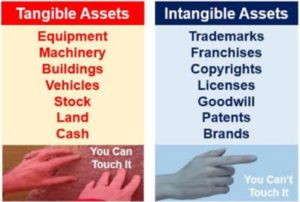Digital property is one of the biggest trends of our times and it is under our noses. Five of the top seven companies in the United States are primarily digital or intangible asset companies:
- Apple $2.7 Trillion
- Microsoft $2.2 Trillion
- Alphabet (Google) $1.8 Trillion
- Amazon $1.5 Trillion
- Meta (FaceBook) $635 Billion
Most of the market valuation is coming from the way the market values the intangible assets of the company. They feature business models that generate revenue and have significant barriers to entry. In fact, analysts estimate that over 85% of the S&P 500 value is intangible.
Many are near monopolies in the core business.
- Microsoft still has 76% of the desktop OS market.
- Google has over 91% of the worldwide search engine market.
- Meta controls over 90% of the personal social networking market;
All of these companies have been great investment opportunities.
- Google has a return of roughly 800% for investors in the last 10 years;
- Microsoft has returned roughly 1074% in the same period;
The question is whether there are niche opportunities left for entrepreneurs and individual investors. I believe that these opportunities are NOT available to most because they are often “special circumstance”.
Advantages to internet properties over real estate include:
- An internet property can be developed at a fraction of the price of buying a house and doesn’t require the same cash reserves.
- Design thinking and Lean startup methodologies can be used to greatly reduce software development and marketing costs.
- One can scientifically and methodically test a number of theories within days. Jeff Bezos notes that a home run is not limited by four bases – it might be 1000 bases.
- A website property can serve thousands of subscribers versus a single family. Real real estate is constrained by the number of tenants.
- An internet property is not confined to a geographical area. It can have a worldwide reach almost overnight.
- Hosting infrastructure companies…namely AWS, Azure, Rackspace, YouTube can provide instant infrastructure and greatly reduce the capital equipment investments.
- Other infrastructure companies support content management, subscription billing and more allowing one to focus on solving a specific problem.
- Search engines and social media can provide a predictable, low cost and steady flow of traffic and leads.
Challenges include:
- Finding a novel idea for a new product or service is not easy. It usually takes specific industry insights and most of us may not be privy to these insights.
- Many great opportunity areas are already taken. CRM dating sites have been done many different ways. But even so, Salesforce.com has only 20% of market share and Match Group which includes Match.com, OKCupid and Tinder dominates with only 25%.
- Good web properties will require development. To extend the metaphor it’s like being Marriott and building the hotel. Creating internet platforms is a skill set.
- Many great domain names (brands) are already taken but can be purchased for a premium if needed.
- Getting internet traffic (eyeballs) and sales is key and challenging and can cost money. Salesforce and ZenDesk spend nearly 50% of gross revenue on marketing.
Business models include:
- E-commerce – selling digital or physical products over internet;
- Directory listings;
- Membership Communities;
- Digital Content providers (books, video training, entertainment);
- Value Added Hosting;
- Software as a Service (SaaS);
In future blogs we will explore each of these business models.



Recent Comments